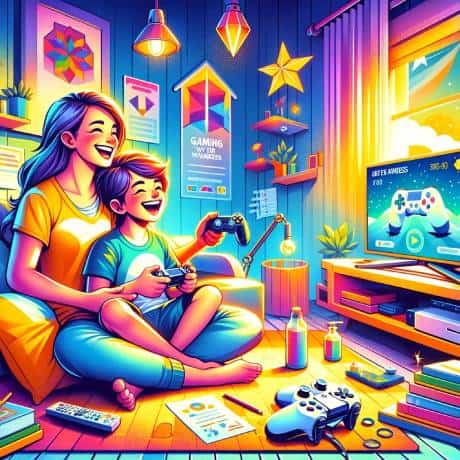Gaming with Awareness: Strategies for Parents of Autistic Kids
Table of Contents
In our digital age, video games have become a prominent source of entertainment and learning for children worldwide. For autistic children, video games can offer a unique, engaging world where they can excel, find comfort in structured environments, and sometimes connect more easily with others. However, like any good thing, it’s important to navigate video gaming with balance and awareness.
Recent discussions and studies have highlighted concerns about video game addiction and its impact on children, particularly those with autism. Autistic children might be more susceptible to becoming intensely focused or fixated on video games, which can lead to challenges in managing time and prioritizing other essential activities in life.
Fostering a healthy relationship with video games
Here are a few thoughts on fostering a healthy relationship with video games for our autistic loved ones:
-
🕒 Structured Playtime:
Establish clear guidelines for gaming, including time limits and appropriate game choices, to encourage a healthy balance between play, responsibilities, and offline activities.
-
🌈 Diverse Interests:
Encourage engagement with a broad range of activities that can also fulfill the child’s need for structure, achievement, and social interaction.
-
💬 Communication and Connection:
Use their interest in video games as a bridge to connect, discussing the games they play and exploring the themes together. This can also be an opportunity to teach about online safety.
-
🔍 Monitor and Adjust:
Stay observant of their behaviour and mood relating to video game usage, ready to adjust rules and strategies as needed to ensure their overall well-being.
-
🤝 Seek Support:
If you’re concerned about potential video game addiction or its impact on your child’s life, don’t hesitate to seek advice from professionals who understand autism and addictive behaviours.
As we navigate the challenges and joys of raising autistic children, let’s remember the importance of understanding, patience, and support. Every child is unique, and finding the right balance will always be a personalized journey. Let’s continue to share our stories, strategies, and support with one another in this community. Together, we can help our children thrive in all aspects of their lives, both online and off.
Resources for Supporting Healthy Gaming Habits
We are not affiliated with these websites and the links will take you to an external website.
-
Autism Speaks – Technology and Autism
Offers guidance on using technology and video games to support learning and development in children with autism.
www.autismspeaks.org/technology-and-autism
-
Child Mind Institute – Screen Time Guide
Provides advice on managing screen time and video gaming for children with autism and other developmental issues.
www.childmind.org/topics/screen-time-and-children
-
Common Sense Media
A resource for finding age-appropriate video games and apps that can support the development of social skills and provide educational content. www.commonsensemedia.org
-
The National Autistic Society – Internet and Technology
Offers tips and information on how children with autism can safely enjoy and learn from the internet and video games.
www.autism.org.uk
-
Understood – For Learning and Thinking Differences
Provides resources and support for families of children with learning and thinking differences, including how to balance video games and screen time.
www.understood.org
-
Family Online Safety Institute
Offers guidelines and tips for ensuring children’s online safety, including while playing video games.
www.fosi.org
-
HealthyChildren.org – Media and Children
By the American Academy of Pediatrics, this site offers a customizable Family Media Plan to help balance digital and real-life activities.
www.healthychildren.org/English/family-life/Media
-
Cyberbullying Research Center – Gaming
Provides resources for understanding and addressing cyberbullying in online gaming environments.
www.cyberbullying.org
FAQ
Can video games be useful for practising social skills?
Yes, video games can be an effective tool for practising social skills, especially for individuals who may find face-to-face interactions challenging. Here’s how:
-
Structured Interaction:
Many video games offer structured environments where players can interact with each other through predefined roles and objectives. This can provide a less intimidating space for practising communication and collaboration.
-
Social Cues and Emotional Regulation:
Multiplayer games often require players to work together to achieve common goals, offering opportunities to interpret social cues, manage emotions, and adapt behaviours in real-time.
-
Safe Environment for Trial and Error:
Video games provide a low-risk setting for individuals to experiment with different ways of interacting, allowing them to see the consequences of their actions in a controlled environment.
-
Building Confidence:
Success and proficiency in games can boost self-esteem, which is crucial for social interactions. The positive feedback loop from gaming can encourage players to engage more in social contexts.
-
Online Communities:
Many games have associated online communities where players discuss strategies, share experiences, and form friendships. This can be a valuable space for individuals to express themselves and connect with others who have similar interests.
-
Empathy and Perspective-Taking:
Role-playing games, in particular, can offer players the chance to experience stories from diverse perspectives, enhancing empathy and understanding towards different viewpoints.
Language and Communication Skills:
Online multiplayer games often require verbal or written communication, providing a platform for practicing language skills and learning to express thoughts clearly and effectively.
What types of video games are most beneficial for autistic children?
Games that stimulate creativity, require strategic thinking, offer opportunities for social interaction, or have educational content can be particularly beneficial, helping with everything from language development to social skills and beyond.
How much gaming time is considered healthy for an autistic child?
The appropriate amount of gaming time can vary based on the child’s age, specific needs, and other daily activities. It’s crucial to create a balanced schedule that includes time for physical activity, social interaction, and other interests.
See “Screen Time Rules for Kids: Age-by-Age Guide for Parents“.
Can video games exacerbate sensory sensitivities in autistic children?
Some video games might overstimulate children with sensory sensitivities due to intense graphics, sounds, or fast-paced action. It’s important to choose games with suitable sensory input and to monitor the child’s comfort level. One suggestion would be to search online for the gameplay of the game your child is interested in, YouTube is a good resource for gameplay videos and reviews.
Why Monitoring for Overstimulation is Important:
-
Sensory Processing: Autistic children may have different sensory processing thresholds. What might be exciting and engaging for one child could be overwhelming or distressing for another.
-
Individual Preferences: Each child has unique preferences and sensitivities. Monitoring and understanding these can help tailor gaming experiences to their comfort level.
- Preventing Negative Experiences: By avoiding games that are likely to cause sensory overload, parents can help prevent negative experiences that could deter children from engaging with video games in a healthy way.
How to Implement This Approach:
-
Gameplay Videos: Watching gameplay videos on platforms like YouTube is an excellent way to preview the sensory demands of a game. These videos can give a clear idea of the game’s pace, visual and auditory intensity, and overall vibe.
-
Read Reviews: Many gaming websites and forums provide in-depth reviews of video games, including discussions about the game’s intensity, complexity, and potential issues for sensitive players.
-
Trial Periods: If possible, use trial periods or demos to test how the child reacts to the game in a controlled setting. Some platforms allow you to download a demo version of the game for free.
-
Adjust Settings: Look into whether a game’s settings can be adjusted to reduce sensory input, such as lowering the volume, dimming the brightness, or slowing down the pace.
- Engage in Discussion: Talk with your child about what they are experiencing during gameplay. This can help you gauge their comfort level and make them feel involved in choosing games that are right for them.
By taking these steps, parents can help ensure that video games are a positive part of their autistic child’s life, providing entertainment, learning, and social opportunities without causing undue stress or sensory overload.
What video games are good for Autistic Children?
We have a list of game suggestions here.
What signs should parents look for to identify video game addiction in their autistic child?
Signs may include neglecting other activities and responsibilities, changes in mood related to gaming, excessive frustration when not gaming, and an inability to reduce gaming time despite negative consequences. See “Video Game Addiction in Children and Adolescents: Signs, Symptoms, and Strategies“.
Disclaimer: It is important to understand that the information provided here is intended for general informational purposes only and should not be seen as a substitute for professional medical advice, diagnosis, or treatment. We encourage parents and guardians to consult with qualified healthcare professionals or specialists in autism spectrum disorders to obtain tailored advice and support that meets the specific needs of their child.
Author:
 |
Lionel Thomas Father, Gamer and Founder with a Passion for Health, AI, Environment and Gamification of Life. |
Author Tools:
- ChatGPT (Content Enhancements & Research)
- GSpeech (Audio by AI)
- Other Tools (AI)...
Artists:
References:
-
1. What Is Autism Spectrum Disorder?
American Psychiatric Association (APA)
https://www.psychiatry.org/patients-fami...
Summary:
Autism Spectrum Disorder (ASD) is a complex developmental condition marked by challenges in social communication, restricted interests, and repetitive behaviors, affecting an estimated one in 36 children according to the CDC. Symptoms often become evident in early childhood, with diagnosis based on observation, interaction, and sometimes additional testing by specialized professionals. Although ASD is lifelong, the severity of impairment varies. Risk factors include genetic conditions, certain prenatal medications, and parental age, but vaccines are not linked to ASD. Treatment focuses on improving functioning through interventions like applied behavioral analysis, social skills training, and speech therapy, alongside managing co-occurring conditions. While there's no cure, early diagnosis and intervention can significantly enhance quality of life, underscoring the importance of early evaluation and access to support services.
-
2. Playing games can improve physical performance in children with autism
National Library of Medicine (NIH)
https://www.ncbi.nlm.nih.gov/pmc/article...
Summary:
This study explored the impact of physical activities (PA) on motor skills (MS) in children with autism spectrum disorder (ASD), highlighting the benefits of structured programs like "I Can Have Physical Literacy" (ICPL) and "Sport, Play, and Active Recreation for Kids" (SPARK) for enhancing motor proficiency. Conducted with 30 high-functioning autistic children, the research found significant improvements in both gross and fine motor skills among participants who engaged in these programs compared to a control group that received no intervention. The ICPL program, tailored for children with ASD, showed a positive effect on their motor skills, emphasizing the importance of specialized physical activity programs in supporting the developmental needs of children with ASD. These findings suggest that engaging children with ASD in tailored physical activity programs can significantly improve their motor skills, which are crucial for their overall development and participation in daily activities.
-
3. A systematic review of problematic video-game use in people with Autism Spectrum Disorders
ScienceDirect
https://www.sciencedirect.com/science/ar...
Summary:
This systematic review summarizes research on problematic video game (PVG) use among individuals with Autism Spectrum Disorders (ASD), highlighting the increased risk of PVG in this population compared to non-ASD youths. It examines factors contributing to PVG, including internal aspects like attention and oppositional behavior problems, and external influences such as social aspects, access to games, parental rules, and game genre. Despite the growing body of evidence, there remains a lack of research on the consequences of excessive gaming in ASD individuals. The review calls for more studies to address these gaps and for clinicians and parents to engage more in preventing and managing PVG among ASD individuals. It emphasizes the importance of understanding PVG use within the ASD population to develop effective strategies for prevention, diagnosis, and treatment, considering the unique challenges faced by individuals with ASD in regulating video game use.
-
4. The use of analog and digital games for autism interventions.
American Psychiatric Association (APA PsycNet)
https://psycnet.apa.org/record/2021-7988...
Summary:
This scoping review discusses the use of gamification in interventions aimed at improving social communication and addressing cognitive, learning, and physical challenges in autistic individuals. It targets educators, practitioners, and parents, detailing studies that explore game-based methods to enhance the lives of autistic children, adolescents, and adults. The review highlights the potential of gamification to provide a more naturalistic and engaging context for fostering and assessing desired behaviors and cognitive skills. It also suggests ways in which research on gamification and autism can be advanced and practically implemented. Furthermore, the review offers resources for parents, professionals, and academics to integrate game-based psycho-educational programs into their existing practices, emphasizing the importance of innovative approaches in supporting the development of autistic individuals.








 Snacks
Snacks Water
Water Eye Sight
Eye Sight Hearing
Hearing














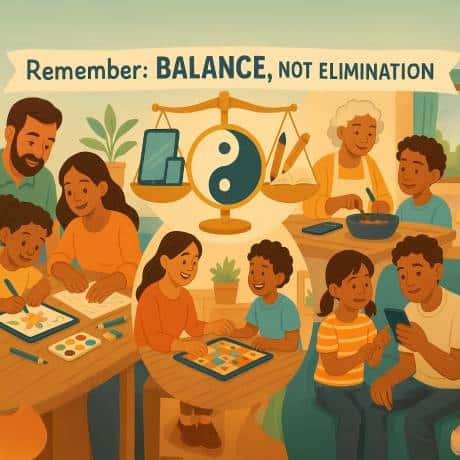

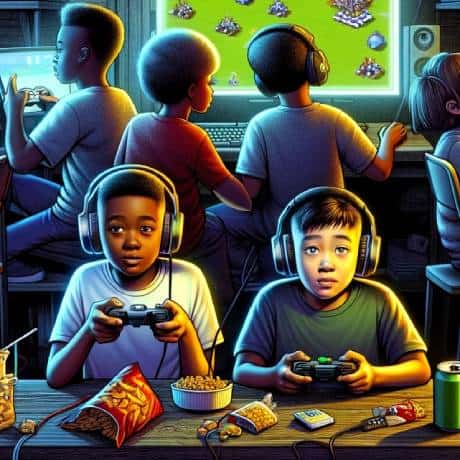

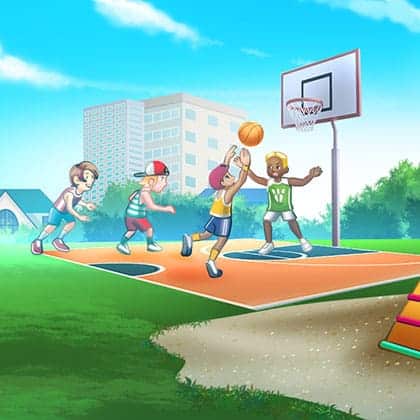



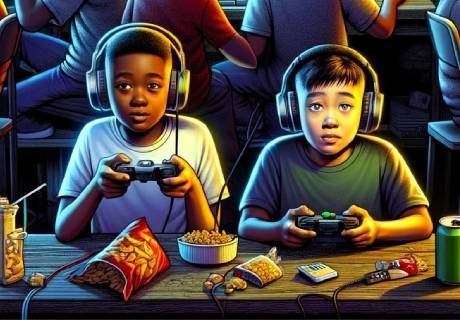
 Screen Time
Screen Time Play Sports
Play Sports


